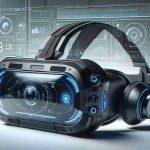In the realm of game development, Unity Technologies has consistently stood out, and its market presence is even more significant with the recent surge in its stock price, or “share price”. Unity’s share price has witnessed a robust increase, primarily driven by groundbreaking advancements in gaming technology. Investors and developers alike are turning their eyes towards this prolific platform, as exciting innovations and future potential promise to redefine the landscape of game development.
The meteoric rise in Unity’s share price is attributed to recent technological breakthroughs that enhance real-time 3D content creation, offering unprecedented efficiency and quality. By integrating artificial intelligence into the pipeline, Unity has fundamentally changed how games are developed and played. This innovation allows for more lifelike characters and worlds, elevating the gaming experience to new heights.
Additionally, with the growing popularity of augmented reality (AR) and virtual reality (VR) platforms, Unity’s versatile engine has become a go-to tool. Developers appreciate its flexibility and cross-platform capabilities, further increasing its adoption in cutting-edge projects. This surge in demand forecasts a promising future for Unity’s share price as its technology facilitates the seamless building of immersive and interactive environments.
In conclusion, the upward trend in Unity’s share price reflects its pivotal role in the evolution of gaming technology. As Unity continues to lead with transformative tools and solutions, industry experts speculate that the company will remain a key player, shaping the future of game development for years to come.
Unity’s Growing Influence: The Hidden Impact on Communities and Controversies Unveiled
Unity Technologies’ stock price surge is undeniably analyzed in the tech and investment sectors, but its far-reaching implications on communities and countries are less often spotlighted. Beyond the immediate financial excitement, the repercussions of Unity’s advancements ripple through various facets of society.
How does Unity’s growth shape communities worldwide? As Unity continues to advance, its influence extends beyond the digital world into local economies. The demand for skilled developers versed in Unity’s engine has spurred educational institutions to revamp curricula, emphasizing game development skills. This demand creates job opportunities and fosters economic growth in tech-focused hubs globally.
Interesting Facts and Controversies: Unity’s innovative integration of AI in game development raises intriguing questions about the future of creative industries. While AI-driven tools offer realism and efficiency, critics argue they could potentially homogenize creativity, threatening independent developers’ unique voices. Additionally, the focus on immersive AR/VR raises privacy concerns. As these technologies become mainstream, safeguarding personal data within virtual environments could become contentious.
Advantages and Disadvantages: Unity’s technological breakneck speed presents clear benefits—enhanced graphical fidelity and immersive realism make games more engaging. However, the push for cutting-edge tech may widen the digital divide, as small developers struggle to keep pace with prolific projects demanding significant resources.
Society must ponder, will Unity’s innovations democratize game development, or will they engender a new form of digital elitism? While the verdict remains open, Unity’s influence is undeniable.
For those keen to explore Unity Technologies’ ongoing developments, visit Unity.
















